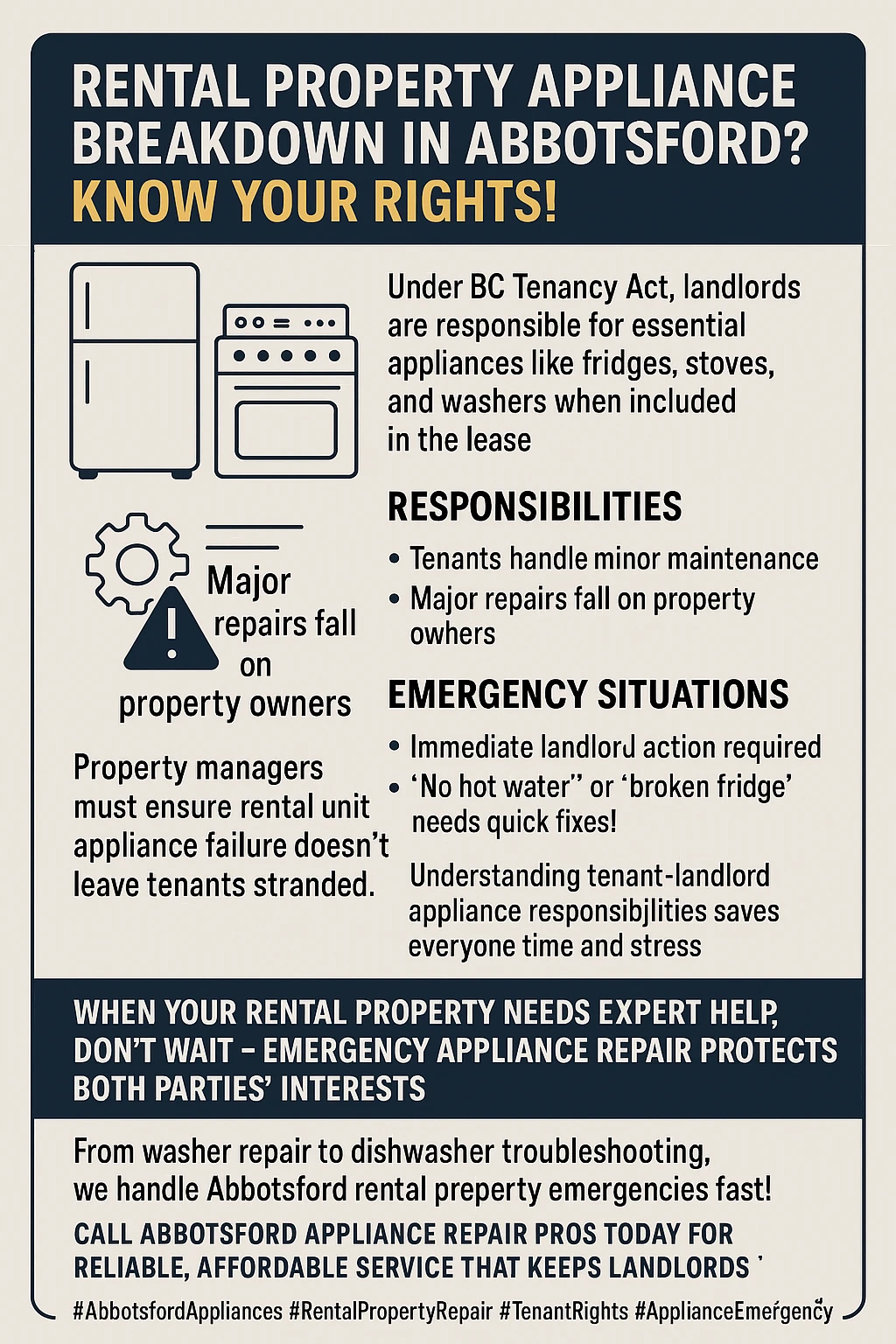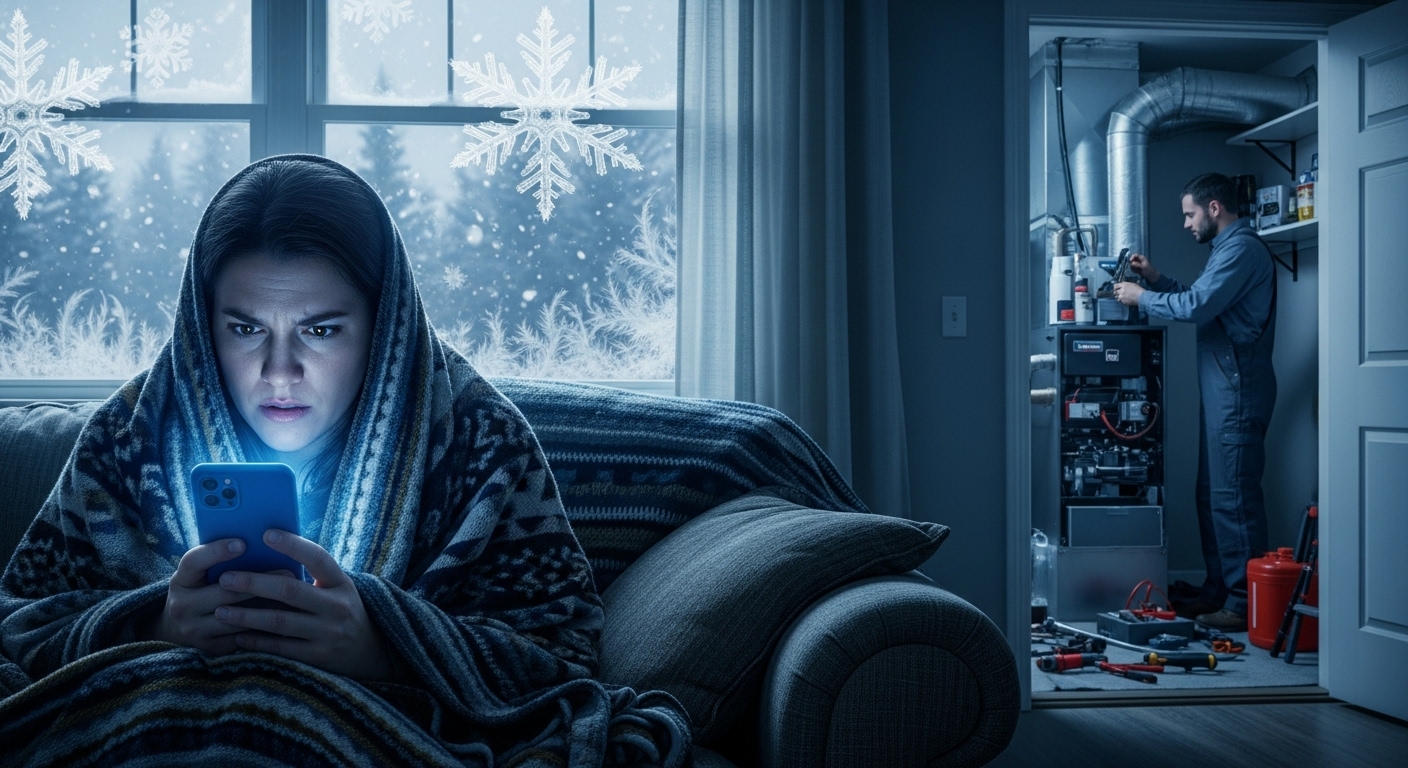Dealing with a broken rental property appliance in Abbotsford and not sure who’s responsible for the repair costs? We’ll break down the exact legal responsibilities for both tenants and landlords under BC law, plus reveal your emergency repair rights that could save you hundreds of dollars.
Picture this: you’re a tenant in Abbotsford, and your refrigerator suddenly dies on a sweltering July weekend, threatening to spoil hundreds of dollars worth of groceries. Or maybe you’re a landlord who just received an angry call about a broken dishwasher flooding a tenant’s kitchen floor. These scenarios play out daily across the Fraser Valley, yet most people have no clue about their actual legal rights and responsibilities under BC’s Residential Tenancy Act. The confusion often leads to heated disputes, unnecessary expenses, and damaged relationships that could easily be avoided with proper knowledge.
Understanding appliance repair responsibilities in Abbotsford rental properties isn’t just about knowing who pays for what – it’s about protecting your financial interests, maintaining good relationships, and ensuring everyone’s safety. The Fraser Valley’s unique climate conditions, combined with BC’s specific tenancy laws, create a complex landscape that differs significantly from other provinces and regions. Whether you’re dealing with humidity-damaged appliances from coastal weather patterns or navigating emergency repair procedures during winter storms, knowing your rights can mean the difference between a quick resolution and a costly legal battle.
The stakes are higher than most people realize. A single appliance breakdown can trigger disputes involving thousands in repair costs, security deposits, rent reductions, and even formal hearings at the Residential Tenancy Branch. Add Abbotsford’s competitive rental market and seasonal service availability challenges, and suddenly that broken washer becomes a major financial and legal headache. But here’s the good news: armed with the right knowledge, both tenants and landlords can navigate these situations smoothly while protecting their interests and maintaining positive relationships.
Key Outtakes:
- Landlords are legally responsible for maintaining appliances included in tenancy agreements, but tenants can be liable for damage beyond normal wear and tear
- Emergency repair rights allow tenants to arrange repairs independently and seek reimbursement when landlords fail to respond, but strict procedural requirements must be followed
- Abbotsford’s Fraser Valley climate creates unique appliance challenges that affect repair frequency and costs compared to other BC regions
- Proper documentation is crucial for dispute resolution, with specific evidence requirements that determine success in formal hearings
- Preventive maintenance and clear communication can significantly reduce repair costs and legal disputes for both parties

Legal Framework Under BC’s Residential Tenancy Act

Let me tell you about Sarah, a first-time landlord in Abbotsford who thought providing appliances would make her rental more attractive. When her tenant’s dishwasher started leaking, she assumed it was the tenant’s problem since “they used it every day.” Three months and a hefty legal bill later, she learned that BC’s Residential Tenancy Act places clear obligations on landlords to maintain appliances included in rental agreements. This expensive lesson illustrates why understanding the legal framework is absolutely critical for anyone involved in rental property appliance maintenance.
Under section 32(1) of the Residential Tenancy Act, landlords must ensure rental properties comply with health, housing, and safety standards while remaining suitable for occupation. This fundamental requirement extends specifically to appliances included in tenancy agreements, creating legally enforceable obligations that can’t be waived through lease clauses. The law doesn’t distinguish between expensive built-in appliances and basic portable units – if it’s provided as part of the rental, the landlord bears responsibility for keeping it functional throughout the tenancy period.
Residential Tenancy Branch Policy Guideline 1 provides detailed clarification on appliance responsibilities, establishing that landlords must repair appliances provided under tenancy agreements unless damage results from deliberate tenant actions or neglect. This guideline covers major appliances including stoves, refrigerators, dishwashers, and laundry equipment, outlining specific maintenance expectations for each category. For instance, landlords must ensure refrigerators maintain proper temperatures and provide accessible cleaning areas, while tenants handle routine cleaning tasks like defrosting and interior maintenance.
The consequences of failing to meet these obligations can be severe for landlords. When repair issues aren’t addressed within reasonable timeframes, tenants can pursue dispute resolution proceedings seeking monetary compensation, rent reductions, and mandatory repair orders. Courts have awarded damages for spoiled food, temporary accommodation costs, and even punitive damages when landlords deliberately ignore repair responsibilities. On the flip side, tenants who cause damage through misuse or fail to report problems promptly may find themselves liable for repairs that spiral beyond the original issue.
Documentation requirements create additional layers of legal protection, though they’re often overlooked until disputes arise. The Act requires written notice for repair requests, establishing clear timelines and communication protocols that protect tenant rights while giving landlords reasonable opportunities to address issues. This requirement isn’t just bureaucratic red tape – it creates an evidence trail that can make or break your case if disputes escalate to formal hearings.
Emergency Repair Rights and Procedures

Building on the legal foundation we’ve established, emergency repair rights represent one of the most powerful yet misunderstood aspects of BC tenancy law. These rights can literally save tenants thousands of dollars and prevent dangerous situations, but they come with strict procedural requirements that trip up even experienced renters. Understanding when and how to exercise these rights can mean the difference between quick resolution and prolonged suffering with broken essential appliances.
The Residential Tenancy Act defines emergency repairs using three specific criteria that must all be satisfied simultaneously: the repair must be urgent, necessary for the health or safety of people or property, and involve specific systems including major leaks, damaged plumbing fixtures, primary heating systems, defective access locks, or electrical systems. This narrow definition means many appliance failures that feel urgent – like a broken refrigerator in summer or non-functional stove – may not qualify for emergency procedures under the law.
Here’s where many tenants make costly mistakes: they assume any inconvenient breakdown qualifies as an emergency and skip the required notification procedures. The law mandates that tenants contact the landlord or designated emergency contact person at least twice, allowing reasonable time between attempts before proceeding independently. Landlords must provide emergency contact information in writing or post it in common areas, creating accountability for response times during critical situations.
When landlords fail to respond appropriately, tenants gain powerful rights to arrange repairs at reasonable cost and seek full reimbursement. However, the devil is in the details – tenants must document all contact attempts, research fair pricing from multiple contractors, and maintain detailed records of repair arrangements and costs. If these procedural requirements aren’t followed perfectly, landlords can successfully challenge reimbursement claims even when the emergency was genuine.
The reimbursement process creates additional pitfalls for unwary tenants. You must provide landlords with detailed receipts and written summaries of repair circumstances while demonstrating reasonable pricing through documented research efforts. If landlords refuse reimbursement, tenants may deduct costs from rent payments, but this requires accompanying written notice explaining the deduction with full supporting documentation. The Residential Tenancy Branch prioritizes emergency repair disputes, but they maintain rigorous standards for evidence and procedural compliance.
Abbotsford’s seasonal weather patterns create unique considerations for emergency repairs that don’t apply everywhere in BC. Winter heating failures or frozen pipes can rapidly escalate into genuine health emergencies, while summer power outages affecting refrigeration can spoil medications and create safety risks. The Fraser Valley’s susceptibility to storms and power outages can complicate emergency procedures when normal communication channels fail, making advance planning and alternative contact methods essential for both parties.
Documentation Requirements for Emergency Repairs

Let me share the story of Marcus, an Abbotsford tenant whose heating system failed during a February cold snap. He followed all the emergency repair procedures perfectly – called the landlord twice with documented times, waited reasonable periods between calls, researched multiple repair quotes, and kept detailed records. When the landlord challenged the $800 repair bill, Marcus’s meticulous documentation won him full reimbursement plus additional compensation for his trouble. This case perfectly illustrates why proper documentation isn’t optional – it’s your lifeline when disputes arise.
Emergency repair documentation must include several critical elements that inexperienced tenants often overlook. First, you need proof of initial contact attempts with specific times, dates, and methods used to reach the landlord or emergency contact. Text
